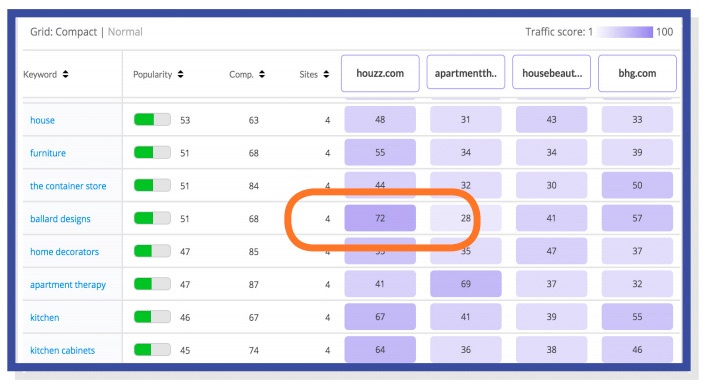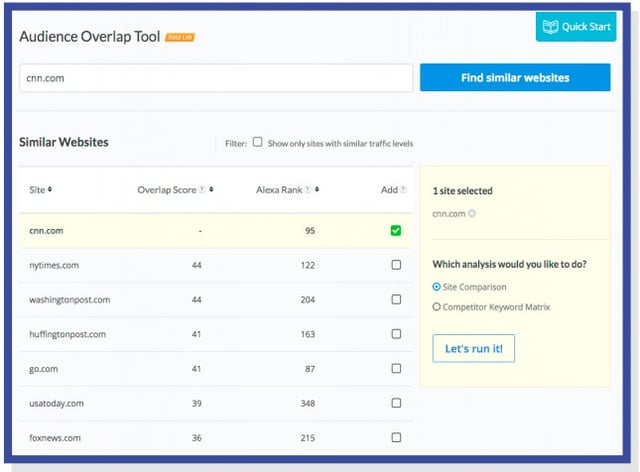INTRODUCTION:
There are more digital tools than ever that marketers use to help them get their job done. And because we use WordPress a lot, many of those tools are plug-in based. But if we're not using WordPress, our favorite go to set of tools is actually found in Alexa’s Marketing Stack.
This is not your father's Alexa - and while Alexa is owned by Amazon, it's different than the voice recognition device in your home (we don't understand that either). Nevertheless, it does delivers a full range of SEO-related products to help you make better decisions, prove your results, and discover new opportunities to improve your website traffic. This blog post is your guide to discovering how Alexa’s tools can help streamline your workflow and grow your business.
Step 1: Getting Started
Alexa’s Keyword Difficulty tool is the optimal place to discover the most relevant keywords for your website, based on your unique ability to rank in search. We take your Competitive Power— a metric that benchmarks the level of keyword competition your site can target—and serve you highly relevant terms that you’re most likely to rank for. With multiple ways to search and a handful of important filters, you’ll never have to click through pages and pages of “maybe” keywords again.
Knowing your site’s strength via your Competitive Power—a measure of your site’s ability to compete in SERPs—will help you choose the keywords you’re most likely to rank for. You can quickly identify the best keywords for your site by looking for the lightning bolt icon beside a keyword in the results. These are keywords that have a competition score at or below your Competitive Power.
Step 2: Start Your Search for SEO Keywords
There are 3 ways to search for keywords with the Keyword Difficulty tool.
- Enter a seed phrase that represents a topic you’d like to create content for.
The keyword results will be based on related phrases that people frequently search for, in addition to the phrase you entered. This is like the “Searches related to…” section at the bottom of Google search results. - Enter a site that has similar content to what you’d like to create, or a similar audience
you want to attract.This will return a list of keyword ideas based on phrases that are already sending traffic to that site. These results will help you create new, highly relevant content for your target audience. - Enter your own site to find new opportunities similar to keywords already driving traffic to your site.
We’ll find new keywords that you’re not already targeting, but that are similar to the ones you are already getting traffic for. This will help you find new ideas related to those you’ve already successfully ranked for. So your likelihood of ranking again is high.
Step 3: Find the Best Keywords for your site
Use the sort and filter options to narrow down the results based on your unique criteria:
• Competition - how difficult it will be to rank highly for a given keyword
• Popularity - how often a keyword is searched
• Relevance - how relevant a keyword is to the site or phrase you entered in Step 2
• Filter by keywords already driving traffic to your site
• Show only results that contain a certain phrase
Alexa’s Competitor Keyword Matrix is the ultimate way to run a complete competitor keyword analysis and identify high opportunity keywords based on “gaps” with your closest competitors. The heat-map style interface uses Traffic Scores to help you quickly identify the type of opportunity you seek, like your competitors’ top keywords or keywords not yet targeted by rival sites.

The Competitor Keyword Matrix allows you to compare up to 10 sites at once (including your own) to see competitors’
keywords that are different from yours.
Enter up to 10 sites into the tool and return a list of keywords driving traffic to those sites. You can sort the results by the following criteria:
• Sites in Common - how many sites are getting some traffic from the same keyword
• Popularity - how frequently users search for a keyword (higher popularity = higher traffic)
• Competition - an estimate of how hard it is to rank highly for a keyword
Or, you can sort each column individually by site to see what keywords are most successful for them. The heat-map style interface uses Traffic Scores to compare and contrast keywords, and the level of traffic from keywords, between sites. Traffic Scores are scores from 1 (lowest) to 100 (highest) that shows relative traffic estimated to a site for a particular keyword. It’s based on a site’s relative position with the search engine results for that keyword, plus the popularity of that keyword. You can use this number to compare who gets the most and least traffic from the same keyword.
CONCLUSION:

Perhaps our favorite of all of Alexa’s tools is the Audience Overlap Tool. It's designed with a particular workflow in mind. It’s a jumping off point for competitor analysis and competitor keyword research, and helps you generate sets of sites that are most relevant to you. Simply enter a site in the tool and click “Find similar sites”. We’ll return a list of sites that share visitors, automatically sorted by most overlap to least. You can sort the list by Overlap Score or Alexa Rank to find the sites that are most useful for your analysis. You can also filter to show only sites with similar traffic volumes. Then, select up to 10 of these sites to analyze them further in a Site Comparison or the Competitor Keyword Matrix tool.
There are dozens of marketing suites and tools that will help you do your job better and help your clients sell more. This is one of our favorite sets. Our others are Hubspot and Yoast. Pick one and learn it well.






